RNC 2020: The speakers and schedule for day four
- Published
Melania Trump: "Look at things from all perspectives"
The Republican National Convention is nearing its conclusion, with Donald Trump set to close the event with a speech making the case for his re-election.
What's been happening at the four-day event?
Let's back up first.
There's an obvious question...
What is the Republican National Convention?
OK, good question.
Party conventions take place once every four years - they are the ceremonial crowning of the party's presidential candidate as they prepare for the final phase of campaigning.
Last time around, we saw the Trump family take centre stage to a backdrop of fireworks and a sea of red, white and blue balloons.
"I would crawl through broken glass to vote for Trump in this election"
It's also where party officials wrap up other less glamorous business, like unveiling the political platform and adopting rules. This time - for the first time - no new platform is being adopted. The party will continue to support Mr Trump's 2016 manifesto.
As the sitting president, Mr Trump is the de facto nominee but the convention has formally nominated him with a roll call, nonetheless.
On Thursday, the president will formally accept the nomination with a big speech.
How is the Republican National Convention being held this year?
The conventions of years past have been glitzy affairs, bringing together thousands of delegates, party leaders, activists and celebrities for receptions, speeches and general hyping up of the presidential candidate.
But the pandemic has upended all that.
Unlike its Democratic counterpart, the Republican Convention is hosting some in-person events at venues in Charlotte, North Carolina, and Washington DC, along with speeches delivered remotely.
Each day will follow themes of America as the land of promise, opportunity, heroes and - in a nod to Trump's slogan - greatness.
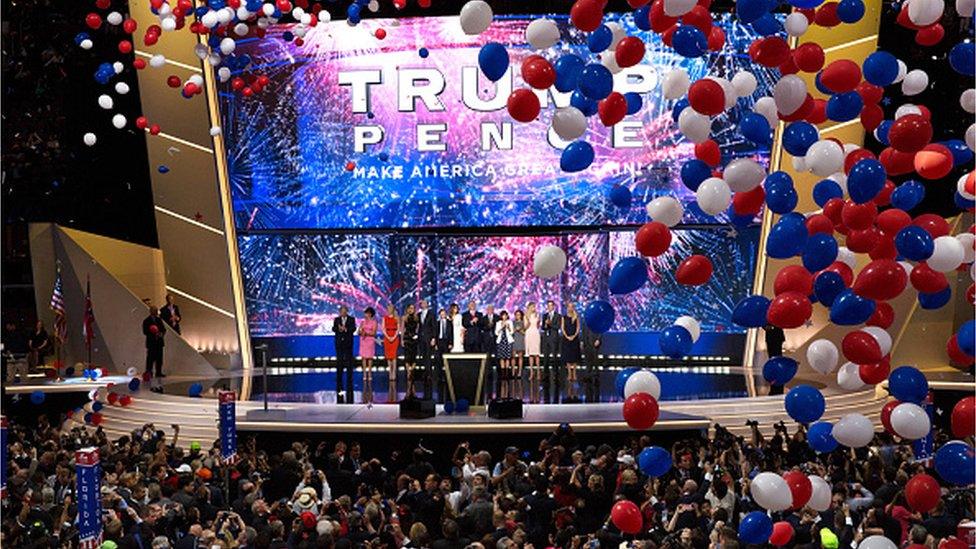
People are being told they need to wear masks and social distance. Those attending events are given a self-swab Covid-19 test before travelling and entering their hotels.
OK, so where will Trump be?
Trump has been involved in some regard each day of the convention, either in person or in recorded videos. He will accept the nomination in a "real speech on Thursday", live from the White House.
This hasn't been entirely well received - with critics arguing using federal property for a campaign speech is unethical.
Who else will speak on the final day?
In addition to President Trump, the following will be speaking on Thursday:
Senate Majority Leader Mitch McConnell
Ivanka Trump, the president's daughter and a senior White House adviser
Alice Johnson, a criminal justice reform advocate whose life sentence was commuted by the president after a campaign led by Kim Kardashian
The parents of Kayla Mueller, an American aid worker who was taken hostage and killed in Syria
Who spoke on Wednesday night?
Vice-President Pence addressed the convention remotely from Baltimore's Fort McHenry, where the city was defended against the British in the War of 1812, inspiring Francis Scott Key to write the US national anthem, The Star-Spangled Banner.
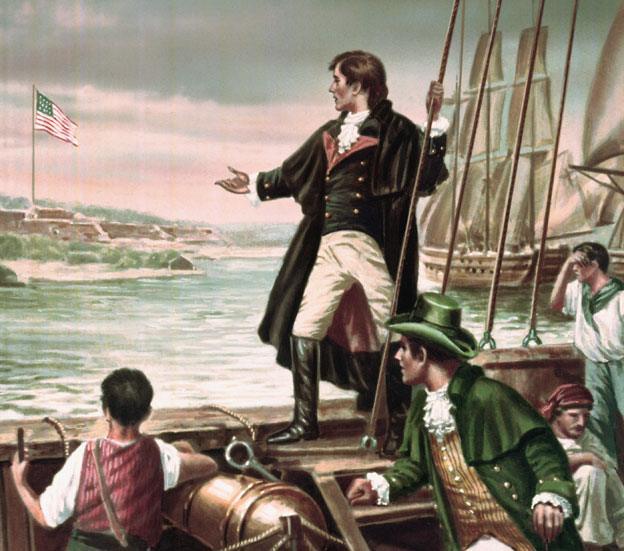
Francis Scott Key saw the flag at the fort and wrote the words that later became the national anthem
The former Indiana governor argued that Joe Biden would set the country on to "a path of socialism and decline".
As pitchman for Mr Trump's re-election, he said voters need "a president who believes in America".
Pence: Stakes in this election never higher
On a night with the theme "Land of Heroes", his wife Karen Pence also addressed the convention, paying tribute to "military spouses".
White House adviser Kellyanne Conway, who is leaving the White House next week, said of Mr Trump: "He has stood by me, and he will stand up for you."
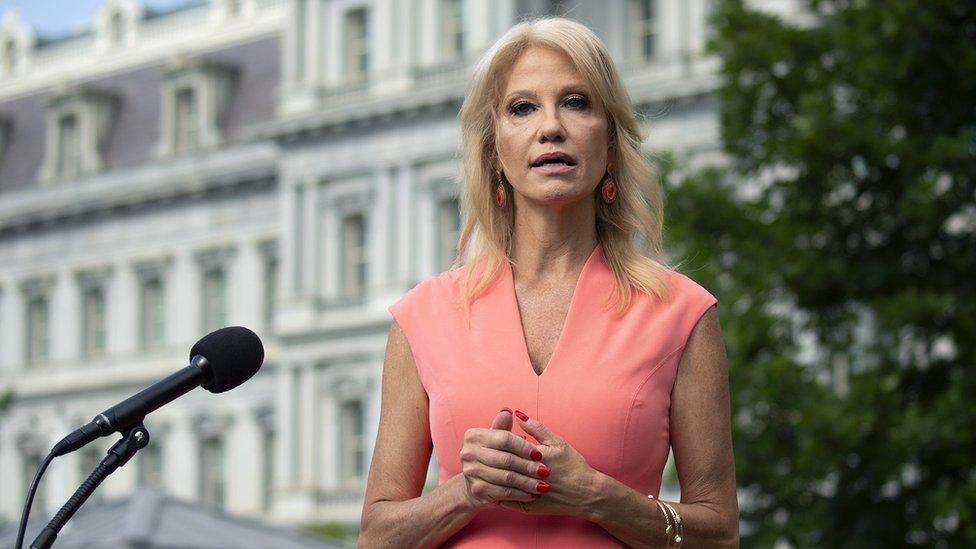
Kellyanne Conway said she had made the decision in order to focus on her children
The 53-year-old announced this week that she was resigning from her post as senior adviser to Mr Trump at the end of August to focus on her children, giving them "less drama, more mama".
Two black speakers on Wednesday spoke in support of President Trump. Clarence Henderson, a civil rights activist from the 1960s, spoke about the power of peaceful protest and the Republican Party's record on civil rights.
Burgess Owens, a former NFL player and Fox News commentator, who is running for office in Utah, pushed Mr Trump's law-and-order message.
Several military veterans also addressed the convention as well as four of the party's rising female stars: Tennessee Senator Marsha Blackburn, New York Representative Elise Stefanik, South Dakota Governor Kristi Noem and presidential daughter-in-law Lara Trump.
Who has already spoken?
US First Lady Melania Trump made a heartfelt plea for racial unity when she delivered a live speech from the White House on Tuesday.
The day also saw two of the president's children, Eric and Tiffany Trump, making fierce attacks on the Democrats while Secretary of State Mike Pompeo delivered a pre-recorded speech from Israel, praising the president's "America First vision".
Normally, the nation's top diplomat does not attend political conventions, and critics called his participation unethical.
Monday, the convention's opening day, was dominated by a speech by President Trump himself in which he warned Republicans their opponents might "steal" November's election.
His claim that postal voting could lead to voter fraud has been dismissed by experts and election officials as a conspiracy theory.
Donald Trump: "This is the greatest scam in the history of politics"
His eldest son, Donald Trump Jr, described Democratic presidential candidate Joe Biden as "basically the Loch Ness monster of the swamp".
What time is the Republican National Convention?
The convention is expected to last 2.5 hours each night, Monday to Thursday, from 20:30 EST (00:30 GMT) to 23:00 EST (03:00 GMT).
You can follow the latest news, including a live page on Thursday, at bbc.com/news. BBC World News and the BBC News Channel (available globally and in the UK, respectively) will broadcast Mr Trump's speech live and bring you reaction and analysis afterwards.
And you can also watch on the Republican National Convention website., external

What to watch out for

Few incumbent presidents of the modern era have faced a challenge as great as the one before Donald Trump in the final months of their re-election campaign. He has consistently trailed Joe Biden in the polls by a modest but significant margin for months. The Republican Convention is one of his last, best opportunities to turn the tide.
The president's speech will be a good guide for how the Republicans hope to conduct their campaign over the final months. Will he focus on tearing down Joe Biden or on accomplishments from early in his presidency? Or will he try to convince the public that the worst days of the pandemic are over?
The Democrats during their convention turned to voices from "ordinary" Americans - immigrants, workers and minorities - who said they had been harmed by the president's policies. The Republicans have countered with ones who will recount how they've been helped - or who are worried about what the Democrats would do in power. Have they made a compelling case?
The rest of the week has been be filled with Republican officeholders of various levels. Some, including Vice-President Mike Pence, will be vying for position to lead the partyonce Trump leaves office - either next year or in 2024.
Four years ago, Trump defied conventional practices and wisdom to win the presidency. He's remade the Republican Party in his image, with an emphasis on conservative populism and sometimes brash rhetoric. That new party, his party, has been on full display this week.

What happens next?
Now we watch as campaigning heats up before the general election on 3 November.
Be sure to set a reminder for the debates too, where we'll see Biden and Trump battle to win over voters. The first presidential debate is scheduled for 29 September with two more in October.
Correction 21st June 2022: An earlier version of this article reported that Clarence Henderson had pushed Mr Trump's law-and-order message and this has been amended to correctly characterise his remarks, which focused on peaceful process and the Republican Party's history.
- Published22 July 2016
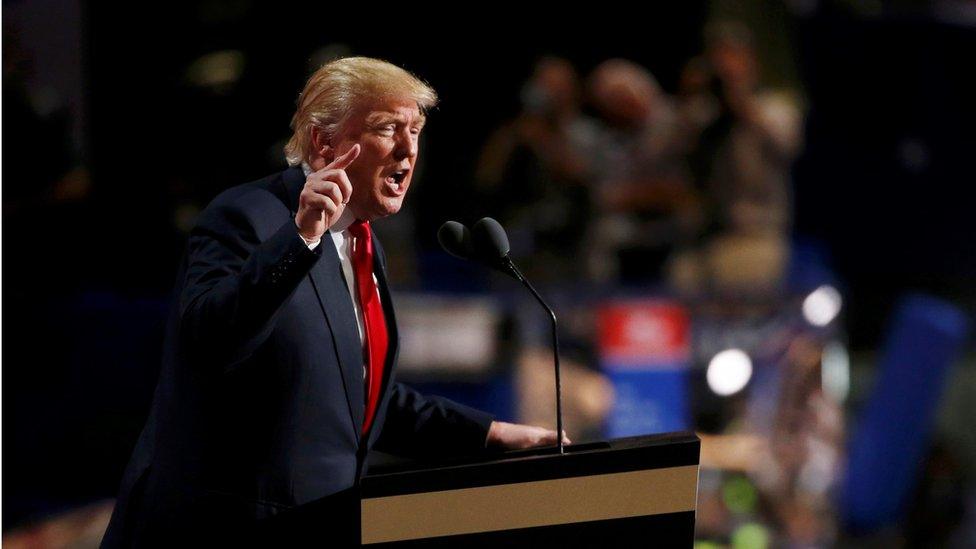
- Published17 July 2016
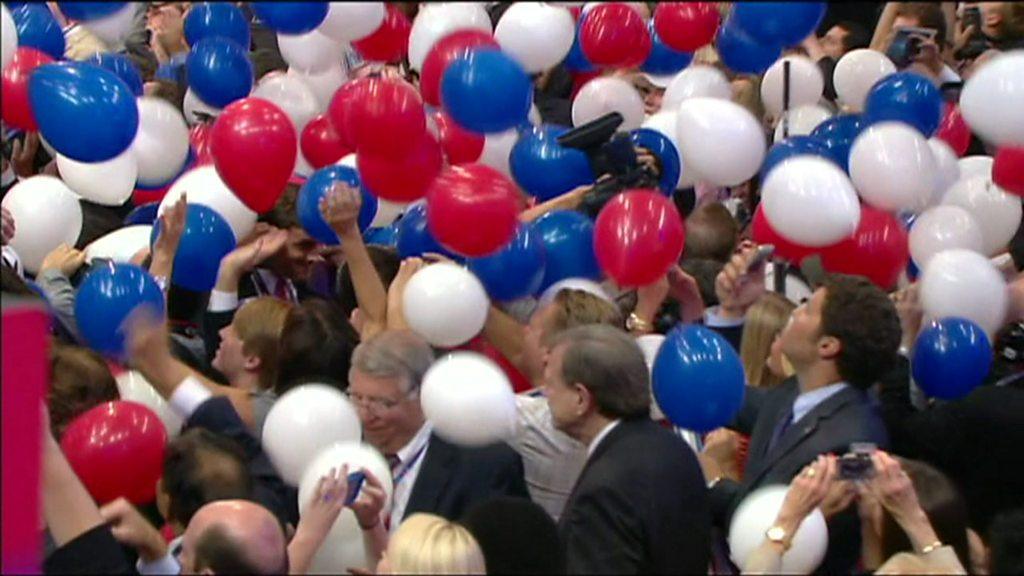
- Published27 August 2020
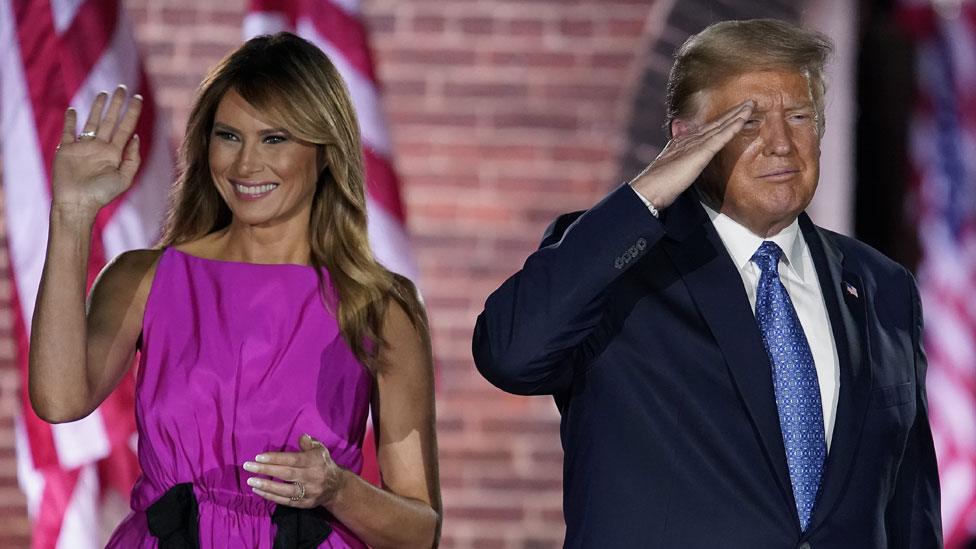
- Published18 July 2016